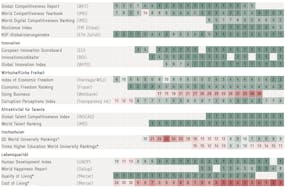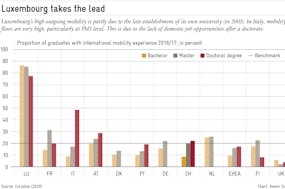There is a certain irony in the student’s loud protests against the introduction of cost-saving measures in education. Honestly, would they have taken to the streets if an additional week of holidays had been decreed, as was the case in Lucerne? I wouldn’t have in any case! Or is today’s youth really more persevering and eager to learn than we were? In any case, it is gratifying to see secondary students committed to causes that are dear to their hearts and uniting to defend them. The younger generation may not be as apolitical and hedonistic after all.
Furthermore, the educational system is not being dismantled as it was decried. The expenditure on education in Switzerland has significantly increased in comparison with revenues. The share in the Confederation’s and cantons’ budget has consistently increased. In politics there is an interest for the more or less rapid growth rate of measures allocated to education, while actual savings are rarely discussed. Currently, nobody in Switzerland wishes for an economic asphyxiation of schools. The fact that knowledge and proficiency represent the country’s main resource is largely accepted by the society as well as in politics and the economy.

Students unjustifiably protesting against the cuts in expenditure on education. (Fotolia)
It also seems clear that more expenditure does not necessarily equate to a better education. Conversely, eliminating optional lessons does not automatically cause the level to drop. A sharp reconsideration of individual offers must not become taboo just because money does not grow on trees. As long as the public sector finances basic education, it is legitimate, even imperative, to demand that public funds be used efficiently in the school system.
Moreover, the quarrel over money diverts us from the fundamental question : what determines success in education? International research reveals that undeniably success in education depends on two central aspects : the quality of the teachers and the autonomy of the institutions. Enthusiastic teachers who epitomize a model for young people are more important than pedagogical concepts, teaching methods, curricula and timetables, regardless of whether there are 20 or 23 students per class. Training and selecting teachers are therefore key questions. It goes without saying that teachers should be well paid for their work and the huge responsibility it represents. And this is the case in Switzerland, where teachers’ salaries are among the highest in the world.
Autonomy implies that schools should have more leeway when taking into account the needs of both students and parents, as well as the possibility to try new experiences. This would enable them to distinguish themselves from neighbouring institutions, and would result in diversity as well as new forms of learning, giving students and parents a real choice. In other words : more competition and fewer regulatory standards. But Switzerland is still far behind in this field. It would be great if secondary students committed themselves to these causes during their next protest.





